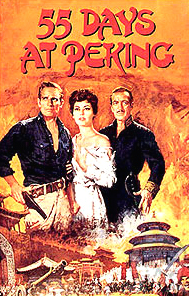|
Newest Reviews:
New Movies -
The Tunnel
V/H/S
The Tall Man
Mama Africa
Detention
Brake
Ted
Tomboy
Brownian Movement
Last Ride
[Rec]³: Genesis
Hara-Kiri: Death of a Samurai
Indie Game: The Movie
Abraham Lincoln: Vampire Hunter
Old Movies -
Touki Bouki: The Journey of the Hyena
Drums Along the Mohawk
The Chase
The Heiress
Show
People
The Strange Affair of Uncle Harry
Pitfall
Driftwood
Miracle Mile
The Great Flamarion
Dark Habits
Archives -
Recap: 2000,
2001, 2002,
2003, 2004
, 2005, 2006,
2007 , 2008
, 2009 ,
2010 , 2011 ,
2012
All reviews alphabetically
All reviews by star rating
All reviews by release year
Masterpieces
Screening Log
Links
FAQ
E-mail me
HOME
| |
55 Days at Peking (Nicholas Ray, 1963)
 Sometime during 55 Days at Peking, Nicholas
Ray's war epic and farewell to Hollywood filmmaking, a character describes the
horrors of "an enormous, empty, Chinese limbo," and unfortunately that
seems a perfectly apt description of this overblown and talky ode to
imperialism. Set in 1900, during the Boxer Rebellion, the movie finds Ray
adopting a pessimistic attitude throughout until he pulls a "happy"
ending out of his ass so that he can celebrate the country’s hostile takeover.
Shot in 70mm ‘Scope, the film offers lavish production values instead of the
humane ideas that are present in so many of the director’s other films. The
rebelling Chinese (who are mostly played by Hollywood actors) are portrayed as a
radical group of Christian-slaughtering monsters, and never is there an attempt
made to offer more than desperation as an excuse for their actions. The
Westerners who oppose them are given the carte blanche of principle to exempt
theirs. There’s an uneasy mixture of the film’s desire to be a simple siege
western in an exotic setting and its attempts to tackle bigger political themes.
Since so much time is spent setting up the political tension that exists between
the Chinese and everyone else, when it never fully develops, the reduction of
everything to pawns in an impressively filmed, but essentially disconnected, battle
sequence disappoints.
Sometime during 55 Days at Peking, Nicholas
Ray's war epic and farewell to Hollywood filmmaking, a character describes the
horrors of "an enormous, empty, Chinese limbo," and unfortunately that
seems a perfectly apt description of this overblown and talky ode to
imperialism. Set in 1900, during the Boxer Rebellion, the movie finds Ray
adopting a pessimistic attitude throughout until he pulls a "happy"
ending out of his ass so that he can celebrate the country’s hostile takeover.
Shot in 70mm ‘Scope, the film offers lavish production values instead of the
humane ideas that are present in so many of the director’s other films. The
rebelling Chinese (who are mostly played by Hollywood actors) are portrayed as a
radical group of Christian-slaughtering monsters, and never is there an attempt
made to offer more than desperation as an excuse for their actions. The
Westerners who oppose them are given the carte blanche of principle to exempt
theirs. There’s an uneasy mixture of the film’s desire to be a simple siege
western in an exotic setting and its attempts to tackle bigger political themes.
Since so much time is spent setting up the political tension that exists between
the Chinese and everyone else, when it never fully develops, the reduction of
everything to pawns in an impressively filmed, but essentially disconnected, battle
sequence disappoints.
There are demonstrations,
somewhere around the midway point of Peking, of the reticence of all
those involved in the conflict, but since practically every character has a
simultaneous crisis of conscience, the gesture feels contrived. It's no surprise
when the film launches back into its earlier warmongering attitudes for an even
more explosive finale. When the cavalry arrives in the final reel, and their
cannon fire crashes into the water with a splash and a rainbow, the spectacle
becomes almost too much to believe. The subsequent, seemingly endless parade of
colorful, multinational troops, each eager to claim the newly defeated China as
their own, is a disgusting display. Any internal conflict that might have
existed is washed away in a wave of bombastic pageantry, which is a fairly
offensive sentiment considering the sense of nationalism that the Boxer
rebellion brought to China. Of course it would be silly to expect a big-budget
film made during sixties to treat China with a sympathetic eye. That scarcely
excuses 55 Days in Peking’s lopsidedness, though. Instead of presenting
a believable recounting of the events of the attacks, the movie offers the
viewer a jingoistic cartoon.
* *
03-23-03
Jeremy Heilman
|